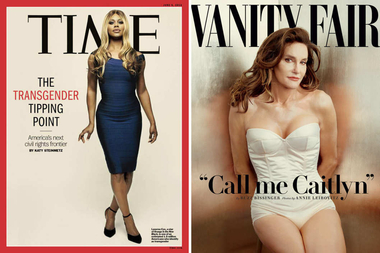This is our time

by Paula Sophia
Special Issues Columnist
A little more than a year before Caitlyn Jenner graced the cover of Vanity Fair magazine, Time Magazine announced we have reached the “Transgender Tipping Point,” recognizing the increasing visibility of trans-identified people in American society by featuring actress and transgender activist Laverne Cox on the cover.
This development, along with Caitlyn Jenner’s very public transition, has placed transgender people in the public eye like never before, prompting a long overdue dialogue about identity and expression. A wonderful thing for sure, but fraught with peril as a backlash has begun, portraying transgender people as threats to public safety and attempting to deny us access to public accommodations.
Later in 2014, the Duggar family, featured on TLC’s 19 Kids and Counting, inserted themselves into local politics as the City of Fayetteville, Arkansas debated a human rights ordinance that included protections against the discrimination of people based on gender identity and expression.
Michelle Duggar recorded a robocall saying, “I don’t believe the citizens of Fayetteville would want males with past child predator convictions that claim they are female to have a legal right to enter private areas that are reserved for women and girls.” The effort contributed to the recall of the human rights ordinance.
Opponents of transgender rights revived this tactic less than a year later when they mounted a campaign to repeal the Houston Equal Rights Ordinance (HERO) by targeting transgender people and spreading a panic about “men” invading women’s and girl’s spaces for the purpose of sexual assault. An ill-informed public responded to the campaign by voting down the HERO legislation last November.
Now, the battle has come to Oklahoma. Senator Joseph Silk (R-Broken Bow) filed Senate Bill 1014 restricting transgender access to public accommodations that match their gender identities but may not correspond with their “biological gender.” This, along with various so-called religious freedom bills, threatens the safety of transgender people in public spaces and sends a message that transgender people are not wanted in the State of Oklahoma. For sure, these measures pose an existential risk to transgender people by fomenting hatred and taking advantage of the general ignorance about trans-identified people in mainstream society.
Obviously, the natural reaction to such blatant hatred is to organize a response, one focusing on developing public awareness about the lives of transgender Oklahomans, an education program, or an advocacy campaign. The problem: a lack of a visible transgender presence in mainstream society. Though some live openly, most do not, preferring to live in “stealth.”
Another problem is the very small number of transgender people. According to Gary J. Gates of the Williams Institute, only 0.5 percent of adults claim a transgender identity.
Though the transgender community is small, we have intersecting interests with larger groups. Of course, we’ve been linked to the gay rights movement from the beginning. Even so, there is much work to be done to educate our own LGBTQ community about our lives and struggles. We also have opportunities to connect with women, especially women who value reproductive choice, a body autonomy issue. Another issue is the incidence of violence against transgender people, particularly transgender women, which is an extension of violence against women in general.
Unfortunately, we don’t have to go back in history too far to see how access to public accommodations was an issue during the late 1970’s and early 1980’s as women in the United States launched a campaign for an Equal Rights Amendment to the US Constitution. Opponents of ERA warned that its passage would make it legal for men to go into women’s restrooms and women to go into men’s restrooms. And let’s not forget the Jim Crow laws that predominated in the southern United States prior to the Civil Rights Movement.
Though the recent legislation targeting transgender people is an unfortunate development, much can be gained from the galvanizing effect this existential threat can have on a group of people. We must unite and become a real community, one invested in our long range welfare, one invested in the human rights of all people. This is our time.
The Gayly - 3/20/2016 @ 2:01 p.m. CST





